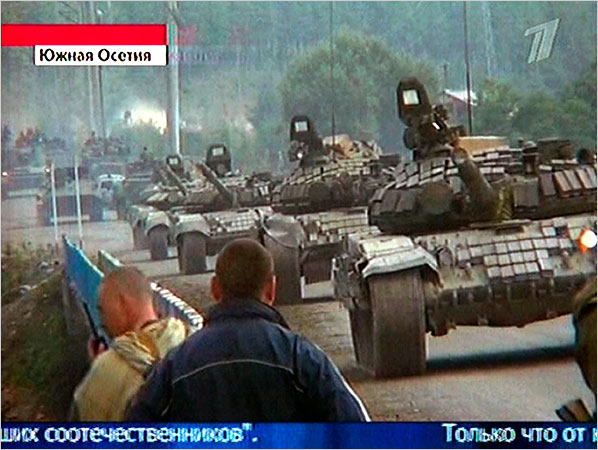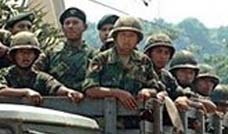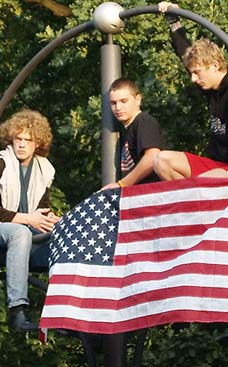
"This is no mere matter of forensic posturing. Just who fired the first shot bears crucially on what American policy toward Georgia should now be, since eligibility for NATO accession should, at least in theory, stem from a prospective member state’s demonstrated ability to conduct sober foreign and defense policies. The colossal error Saakashvili committed when he attacked South Ossetia (and the Russian forces stationed there) proves that he lacks the sangfroid, judgment, and sagacity needed to govern a country in a volatile region bordering Russia. He certainly deserves no billion-dollar reward from his American sponsors for having so heedlessly brought the roof down on himself and his compatriots. Since American support emboldened Saakashvili to launch his nearly suicidal assault on South Ossetia, why are senior American officials still pledging to bring Georgia into NATO, supplying the country with aid, and reaffirming their relationship with the Georgian military? When Russia began thrashing Georgia, the White House, clearly reluctant to antagonize Moscow, quickly ruled out military action. In the future, would an American president really be prepared to send troops to the Caucasus to fight on Georgia’s behalf? Where would the United States, still heavily committed in Iraq and short of boots on the ground in Afghanistan, find those troops? Leaving out the Western “values” Georgia and the United States now purportedly share as allies, and adopting a Realpolitik perspective, why should Washington maintain a military alliance with a tiny, weak, resource-poor country under unpredictable leadership, if doing so alienates a nuclear-armed Russia stretching from Europe almost to Alaska? The hydrocarbon pipelines traversing Georgia figure into U.S. strategic calculus but cannot justify U.S. protection. They funnel only a million barrels of Central Asian oil a day to Western markets; whereas Russia, one of the most hydrocarbon-rich countries on earth, pumps ten million barrels of crude a day and provides Europe with roughly a third of its natural gas. Looming over all these questions is the most daunting issue of all: is the United States, to save Tbilisi, truly willing to put its own population at risk of Russian nuclear retaliation?" Jeffrey Tayler served as a Peace Corps Volunteer in Morocco. He has published numerous articles in Atlantic Monthly, Spin, Harper's and Condé Nast Traveler and is a regular commentator on NPR's "All Things Considered.
Jeffrey Tayler writes: Both Cheney and Rice persist in misrepresenting the Georgia war as having been instigated by Russia
Russia: Back to the Future
Despite Russia’s decisive rout of the U.S.-trained and equipped Georgian military during the August war in the Caucasus, the crisis that has pitted the United States against Russia has not ended. Instead, it is entering a protracted second round, with the gravest potential consequences. On September 3 the White House pledged to “deepen trade and investment ties with Georgia,” and announced a “multiyear commitment of $1 billion in support of Georgia’s economic and recovery needs.” Contrary to what one might expect of such supposedly benign succor, the U.S. has been delivering this support via the warships of the Sixth Fleet, which have docked in Batumi and the port of Poti—an area which was, until September 13, occupied by Russia. On September 4, Vice President Dick Cheney, in Tbilisi for a meeting with Georgian President Mikheil Saakahsvili, denounced Russia’s “illegitimate, unilateral attempt” to forcibly alter Georgia’s borders. He also affirmed that the United States remains “fully committed” to Georgia’s induction into NATO, and called on “the free world to rally to the side of Georgia.” Cheney was echoing the rhetoric of confrontation that Secretary of State Condoleezza Rice had delivered the previous evening: "The free world cannot allow the destiny of a small independent country to be determined by the aggression of a larger neighbor."
Both Cheney and Rice persist in misrepresenting the Georgia war as having been instigated by Russia. This is no mere matter of forensic posturing. Just who fired the first shot bears crucially on what American policy toward Georgia should now be, since eligibility for NATO accession should, at least in theory, stem from a prospective member state’s demonstrated ability to conduct sober foreign and defense policies. The colossal error Saakashvili committed when he attacked South Ossetia (and the Russian forces stationed there) proves that he lacks the sangfroid, judgment, and sagacity needed to govern a country in a volatile region bordering Russia. He certainly deserves no billion-dollar reward from his American sponsors for having so heedlessly brought the roof down on himself and his compatriots.
It will take years to rebuild the Georgian armed forces, which Russia largely destroyed in a few days. White House, State Department, and Pentagon officials have stressed that no decision has been made regarding further weapons shipments to Georgia. But Admiral Mike Mullen, chairman of the Joint Chiefs of Staff, has reaffirmed the U.S. military’s commitment to the country. This, despite the damning evidence that has emerged concerning just how the armed forces performed under Saakashvili’s command during the war. An article published on September 2 by the New York Times describes how the Georgian military reacted to the Russian blitz it provoked by shelling and then invading South Ossetia.
Georgia’s Army fled ahead of the Russian Army’s advance, turning its back and leaving Georgian civilians in an enemy’s path. Its planes did not fly after the first few hours of contact. Its navy was sunk in the harbor, and its patrol boats were hauled away by Russian trucks on trailers.
The David-and-Goliath metaphor now so often applied in describing the Russia-Georgia conflict has merit only if David chooses to stand and fight, not if he drops his slingshot and bungles his way through an ignominious retreat. There were, as far as we know, no valiant Georgian last stands against the Russians; rather, satellite television reports showed the Georgian military and police hightailing it to the relative safety of Tbilisi. Georgia, in any case, indisputably lost the war within twenty-four hours and started suing for peace. No surprise there: the numerical disparity between Russian and Georgian forces (more than ten to one in regular infantry troops alone) makes different outcomes tough to imagine – something Saakashvili should have pondered before shelling Tskhinvali.
An obvious conclusion presents itself: Georgia cannot begin to defend itself against Russia. So, were it to join NATO, the onus of repelling Moscow in future conflicts would fall on other member states—in other words, the United States, the country Saakashvili expected to come to his rescue, but which did nothing as Russia destroyed, disarmed, or dismantled whatever Georgian units did not manage to desert the battlefield quickly enough. Yet in light of all the verbal support Cheney and Rice have given Georgia since the war, and the billion-dollar aid package provided by the White House, Saakashvili could be forgiven for wondering just what the United States’ policy toward his country really is.
Urgent questions arise. Since American support emboldened Saakashvili to launch his nearly suicidal assault on South Ossetia, why are senior American officials still pledging to bring Georgia into NATO, supplying the country with aid, and reaffirming their relationship with the Georgian military? When Russia began thrashing Georgia, the White House, clearly reluctant to antagonize Moscow, quickly ruled out military action. In the future, would an American president really be prepared to send troops to the Caucasus to fight on Georgia’s behalf? Where would the United States, still heavily committed in Iraq and short of boots on the ground in Afghanistan, find those troops? Leaving out the Western “values” Georgia and the United States now purportedly share as allies, and adopting a Realpolitik perspective, why should Washington maintain a military alliance with a tiny, weak, resource-poor country under unpredictable leadership, if doing so alienates a nuclear-armed Russia stretching from Europe almost to Alaska? The hydrocarbon pipelines traversing Georgia figure into U.S. strategic calculus but cannot justify U.S. protection. They funnel only a million barrels of Central Asian oil a day to Western markets; whereas Russia, one of the most hydrocarbon-rich countries on earth, pumps ten million barrels of crude a day and provides Europe with roughly a third of its natural gas. Looming over all these questions is the most daunting issue of all: is the United States, to save Tbilisi, truly willing to put its own population at risk of Russian nuclear retaliation?
Condoleezza Rice’s “Russia expertise” has been nowhere in evidence during this first, fateful crisis with the Kremlin since the Cold War’s end. Why has neither she nor any other senior U.S. official visited Moscow with an eye toward repairing relations? Why did she leave peace negotiations to the European Union, when the very survival of a much-vaunted American ally was at stake? (The ceasefire drafted inexpertly by French President and current E.U. chief, Nicolas Sarkozy, afforded Russia loopholes it has used to justify maintaining forces inside Georgia proper.) Over the past seven years, on numerous occasions, President Bush has hosted his “friend” Vladimir Putin at his Crawford ranch and elsewhere. But now, facing a real emergency, Bush is holding no summits, no Camp-David-style sweatshop parleys with his Slavic counterpart. Bush must have assumed that a combination of blandishments and bluster would keep Russia in its place. Caught flatfooted by reality, his bluff called by Putin, Bush apparently does not know how to proceed, and his cabinet members, long laboring under delusions of U.S. omnipotence, and never having given Russia due attention since 1991 or pondered how it had changed since Yeltsin quit the Kremlin in 2000, cannot offer him sound counsel.
As a result, Russia and the United States find themselves drifting toward a future of confrontation. How can the drift be halted? The answer hinges partly on what Russia is today, and what it is patently not. Neither Russia’s actions nor the pronouncements of Russia’s leadership justify comparisons with Hitler’s Germany. Russia is not bent on the conquest and domination of Europe. It is, however, determined to reassert itself, however problematic this may be to the West, in what it calls its blizhnyeye zarubezh’ye (Near Abroad), lands that belonged to the Soviet Union until 1991, and to the Russian empire before the 1917 Bolshevik revolution. (President Dmitry Medvedev, in a recent interview with Rai Uno, designated these lands “regions of privileged interests.”) Availing itself of elevated commodity prices, cognizant of the deep American military entanglement in Iraq and Afghanistan (and the resulting burden on the U.S. budget), and still smarting from unfriendly acts and humiliations carelessly inflicted by both the George W. Bush and Clinton administrations, the Kremlin is, with the support of the Russian people, returning to play its role on the world stage. But with the United States the de facto, if increasingly wobbly, world hegemon, this means Russia can only act to the detriment of what America perceives as its interests. For the United States, the entire planet has become, in effect, its region of privileged interests.
The sort of grumbling acquiescence that the cash-starved basket-case-land of Yeltsin always gave to Western encroachments in the 1990s would not befit the petro-flush giant now rearing its head. Russia’s ham-fisted response to Saakashvili’s attack on South Ossetia came as no surprise to those listening to the warnings Putin and other senior Russian figures had been issuing since the Bush administration embraced Saakashvili in 2004 and began advocating NATO membership for Georgia. The irony is that one might have expected more from the Bush administration, with its “Russia-expert” secretary of state.
However we might object to Russia’s assertion of its “privileged interests,” or disparage the curtailing of freedoms Putin has overseen, or point out Russia’s many other deficiencies, the fact is, Russia is doing what it is doing because it can—because the United States, overextended militarily and facing a growing economic crisis, cannot oppose it. Is the United States prepared to mobilize its forces to stop it? Mobilization would both limit American military options around the globe and probably require the reinstatement of the draft at home. (It is worth noting that the Bush administration’s 2003 invasion of Iraq could have happened only after the Cold War, when the United States had the strategic leeway and troops to spare for an elective mission.) If confrontation is not a feasible option, then a framework for relations with Russia needs to be established that would stand on recognition of what amounts to, in some but not all formerly Soviet territories, a Russian sphere of influence – however distasteful that might sound today, and however messy it might be to implement, at least initially.
Recognizing a Russian sphere of influence of sorts (perhaps tacitly, or privately, between presidents in bilateral summits), would amount to a reversal of the hegemonic pretensions the United States has displayed since the fall of the Soviet Union. It would also reflect the real balance of power that obtains today across formerly Soviet Eurasia, and would allow the United States to manage its decline with some degree of dignity. The simple fact is that the United States—distant, short of manpower, and lacking funds—cannot counter Russia militarily in Russia’s own backyard. This reality has already turned some countries away from Washington and toward Moscow. (Most recently, Azerbaijan rejected Cheney’s request, made during his visit in early September, for support in building a pipeline to bypass Russia.)
The United States needs a working relationship with Russia. A return to spheres of influence may be the only alternative the United States has to endless tension and confrontation. American words of moral suasion fall on deaf ears in Moscow. The United States has squandered its moral authority in numerous ways – by using force to change Yugoslavia’s borders and create Kosovo; by invading Iraq under a false prospectus; by unilaterally abrogating the ABM treaty with Russia; by permitting the abuses of Abu Ghraib; by engaging in “renditions” across the globe and perpetrating constitutionally dubious practices at home. But if an American president were willing to talk to Russia in terms of interests, and concede that the Kremlin has legitimate interests to defend in the countries along its borders, no doubt the Kremlin would respond. For starters, the United States, in return for not enrolling Georgia and Ukraine in NATO, could demand guarantees of non-interference in these countries’ affairs from Moscow. Countries in NATO or the EU would continue to enjoy the rights and privileges they do now; while those outside the two blocs, after initial disappointment, would be compelled to build relations with Moscow based on strategic, geographic, and political realities that no external military alliance can counter or negate – not even NATO. The most morally reprehensible approach would be to do what the Bush administration did with Georgia – give all sorts of assurances and support, and then, when a crisis erupts, step back and do nothing, letting their trusting, hopeful ally and his people take their fall.
The United States has long regarded the Western Hemisphere as its own sphere of interest under the Monroe Doctrine. Proclaimed in 1823, the Monroe Doctrine states that, “[the United States] should consider any attempt on [the] part [of outside powers] to extend their system to any portion of this hemisphere as dangerous to our peace and safety.” In 1848, President James K. Polk reaffirmed the doctrine, adding, “The United States, sincerely desirous of preserving relations of good understanding with all nations, cannot in silence permit any European interference on the North American continent, and should any such interference be attempted will be ready to resist it at any and all hazards.” Russia, however, has recently begun showing its teeth in the Western Hemisphere, sending long-rage Tu-160 bombers (without their usual load of nuclear weapons) to Venezuela, and broaching bomber flights to Cuba. So far the Bush administration has responded to these moves with restraint. Any agreement on spheres of influence would naturally rule out such encroachments on Russia’s part.
The United States’ “unipolar moment” in history has passed. The sooner we come to terms with this, and plan for a future that makes room for a resource-rich, autocratic Russia, the safer we will all be, in both East and West. Russian and American leaders need to talk—now—and open broad discussions on how the current crisis can be resolved. With all its potential drawbacks, an approach based on spheres of interest would be a good place to start.












